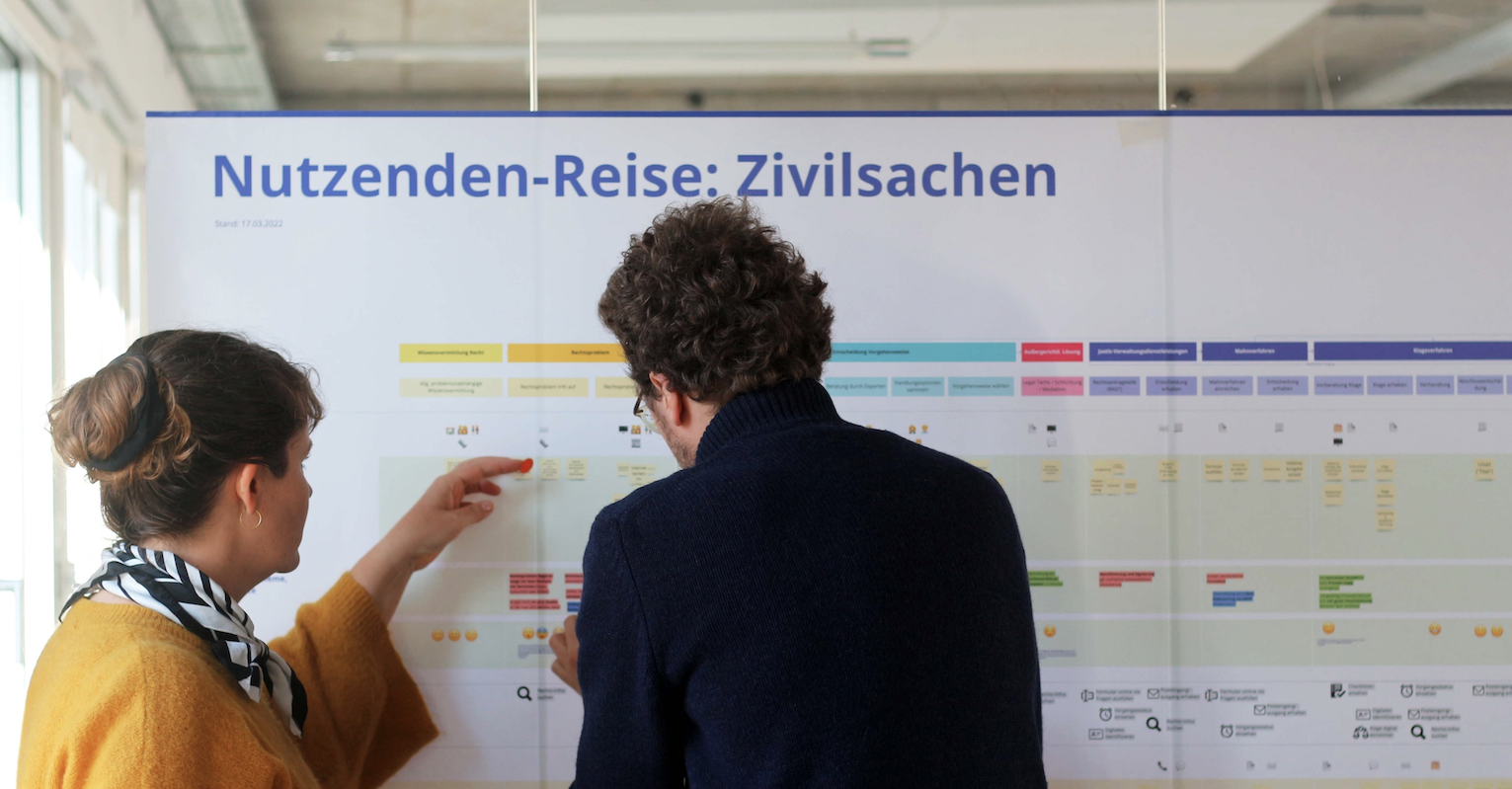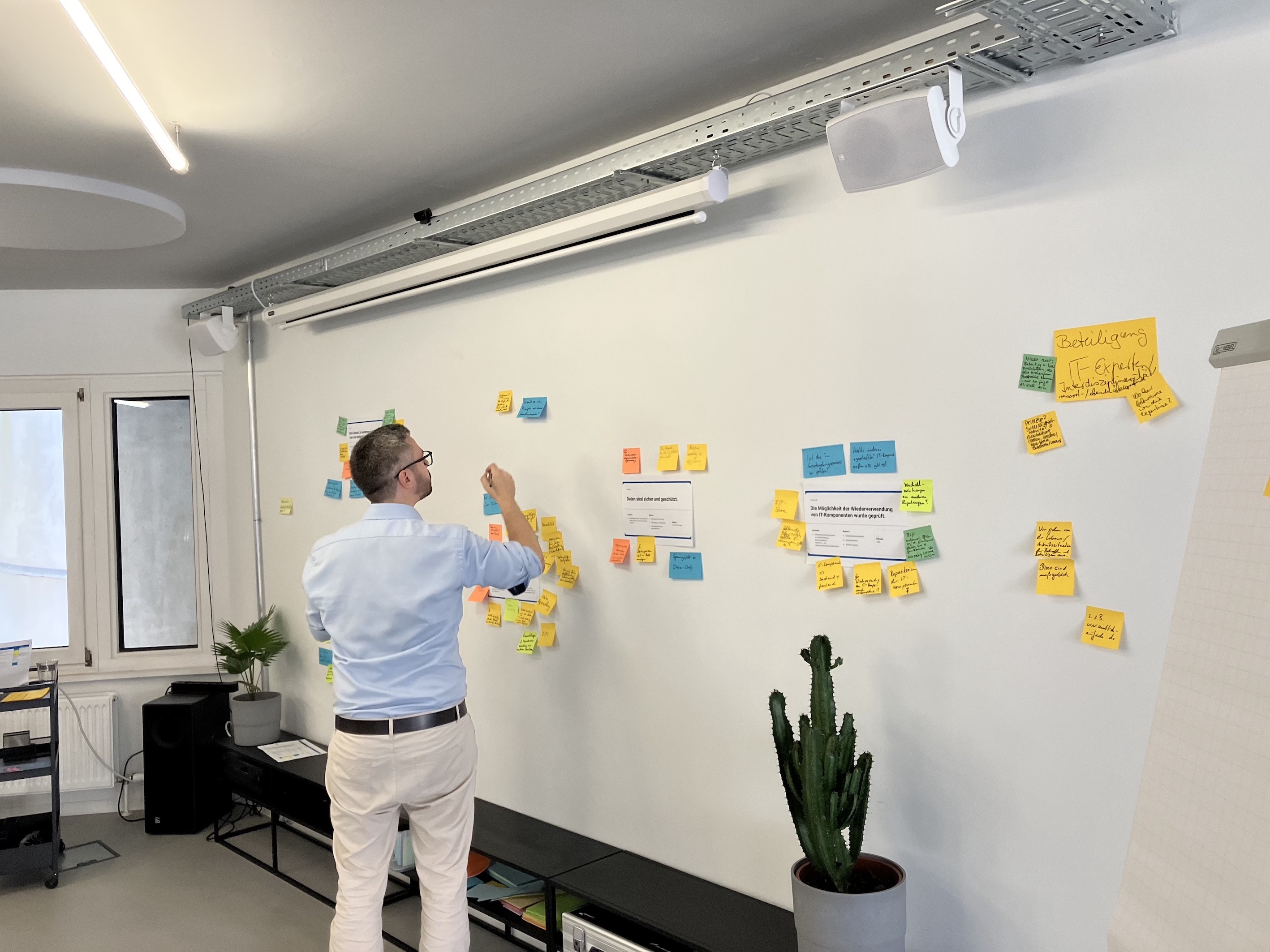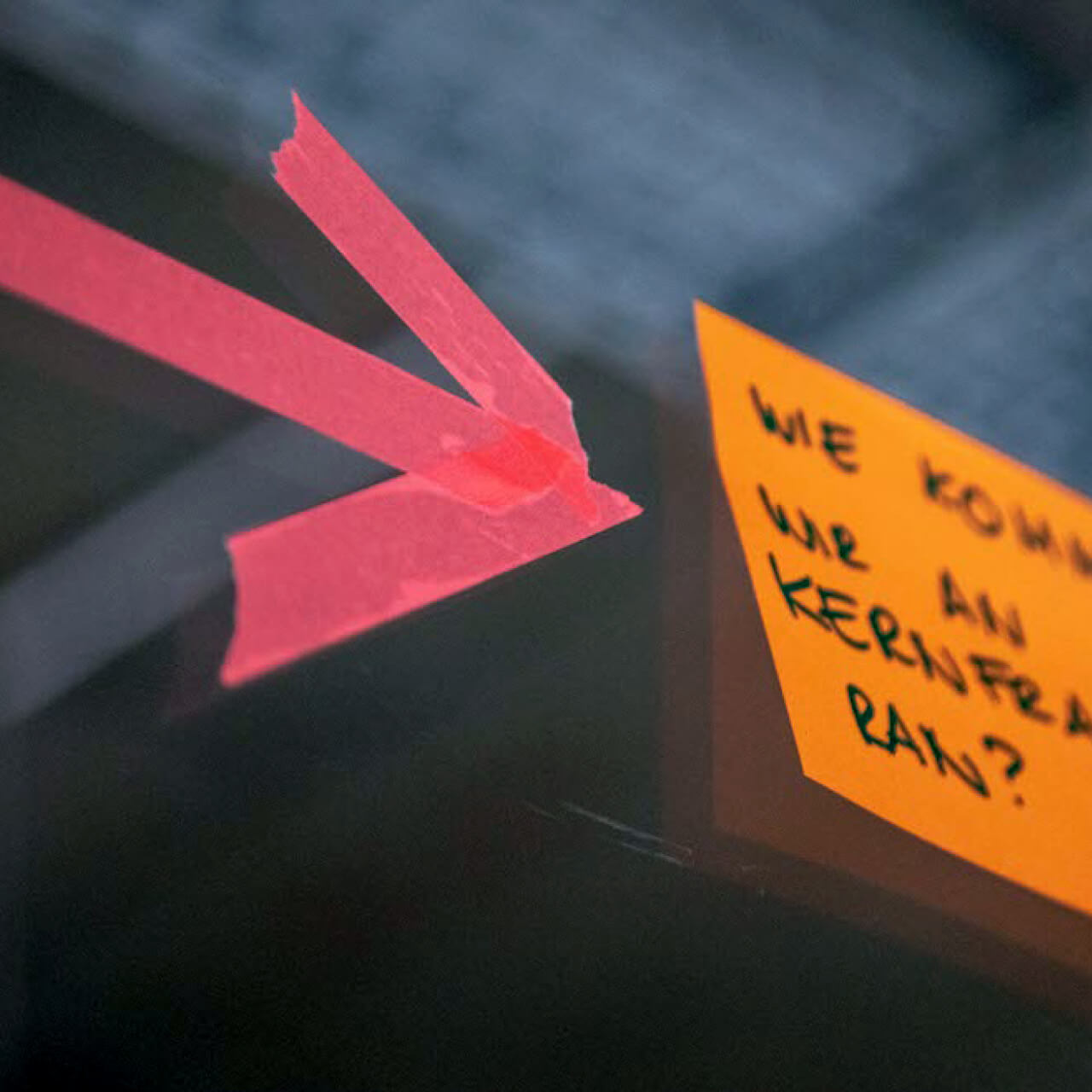

Establishing the foundations for a digital state through digital-ready legislation
In the Federal Republic of Germany, landmark reforms such as the 1958 Equal Rights Act and the 2017 “Marriage for All” Act have shaped the nation’s history, yet the process of drafting legislation has changed little over time. No wonder that the traditional approach to legislation is reaching its limits as we navigate the digital age. Striving for “better legislation” as a core goal of the government's digital strategy, Digitalcheck serves as a key component in achieving this objective. The Federal Ministry of the Interior and Community has now commissioned us to develop the conceptual basis for this key instrument for digital-ready legislation.
With processes and methods that have remained more or less the same for decades, there are currently scarcely any instruments available to draft appropriate, effective laws and regulations for an increasingly digital society. This observation was also confirmed by the National Regulatory Control Council (Nationaler Normenkontrollrat) – the German government's independent advisory body – in a 2019 report. Under present-day conditions, it is becoming increasingly difficult to develop laws which are both legally correct, effective, and practical in a short amount of time. The result: laws and regulations can only partially achieve their intended effect, cannot be implemented as planned or involve unexpectedly high costs and effort for the state, the economy, and society.
Digital-readiness: a main objective of the Coalition Agreement
Digital-ready legislation lays the foundations for a digital state, leading to better services and faster processes for all citizens. In the long run, it has the potential to foster greater inclusion, ensure fairer procedures and strengthen the state's ability to act effectively. This, in turn, promotes trust and confidence in our democracy.

This is why the Federal Government outlined this goal in the Koalitionsvertrag (German only): to improve the quality of laws and regulations and to “examine the possibility of their digital implementation” early on in the legislative process by introducing a so-called “Digitalcheck”.
The aim is to create the foundations to harness the potential of digital solutions through digital-ready legislation and to generate added value for citizens, organizations and, of course, the public administration. Essentially, Digitalcheck is intended to harmonize legislation with the contemporary digital society in Germany. In accordance with the mandate under the Coalition Agreement and the digital strategy (German only), the Federal Ministry of the Interior and Community has taken charge of the project as a whole.
The development of Digitalcheck is closely linked to the Federal Government's extensive preliminary work on „better regulation“.It strategically draws on international experience, such as the OCED’s „regulatory policy“ and the EU’s „Better Regulation: why and how“, as well as on best practices from other countries such as, for example, Denmark.
In the initial stage of the project, our role as DigitalService involves the development of a conceptual foundation, assessing the prerequisites and needs of various stakeholders, and devising tailored approaches for policy drafting personnel - the experts responsible for drawing up legal texts. We can build on groundwork laid by the Work4Germany project “Redesign of Ministerial Legislative Preparation” from 2021, which had already identified impediments and possible solutions for better lawmaking jointly with policy drafters from various ministries.
New processes & methods instead of checklists
Creating digital-ready laws and regulations is a complex task for two main reasons.
Firstly, regulations must accommodate digitalization requirements while also addressing the needs of all stakeholders affected by laws and regulations. This is crucial to ensure seamless digital end-to-end and user-friendly implementation by, for example, public authorities, businesses, and citizens – which means eliminating the need for written or analogue proof requirements.
Secondly, policy drafters in the ministries must be able to effectively harness the opportunities provided by digital implementation when drafting new laws. This requires the appropriate skills, methods, and processes to draft digital-ready regulations and to incorporate them into legal texts.
Taking a holistic view of the entire process is essential. As a first step, jointly with the Federal Ministry of the Interior and Community, we have analyzed existing challenges and needs. We achieved this by breaking down and visualizing the ministerial legislative process at each individual stage.

An excerpt of the process by which a ministry prepares a bill, up to the final vote in the Bundestag and Bundesrat before it becomes law.
Digital readiness starts at the very beginning
Our first insight: The requirements for and possibilities of digital execution and enforcement must be considered as early on as possible in the drafting process. When analyzing the problem area addressed by the proposed law and developing first regulatory approaches, both the respective implementing bodies and digital experts such as developers, designers, and product managers need to be involved. This allows policy drafters to design laws and regulations in a way that enables user-oriented digital implementation. Collaborating in interdisciplinary teams is particularly helpful in developing and refining an optimal, digital-ready regulatory approach.
The Digitalcheck sought by the Federal Government should not produce just another checklist or an additional guideline for policy drafters in the ministries to simply “tick off”. Instead, it is about identifying customized structures, processes, and methods (e.g. to visualize or identify stakeholders) to enable them to develop their regulatory projects with digital opportunities in mind right from the very beginning.
Why we took on this project
This is the DigitalService mission statement:
We are creating digital applications for the state that put the needs of citizens at the heart of it all and work better for everyone.
However, Digitalcheck is not actually a digital application as such. So why are we taking on this project with our product unit?
As the central digitalization unit for the Federal Government, we are directly involved in the digital implementation of regulations like the property tax reform. We are close to the complex issues of digital implementation. Not only do we have a deep understanding of the challenges and needs involved, but we also appreciate the particular importance of legislation from the outset. When new laws and regulations are designed with digital implementation in mind, it is much easier to develop and deploy digital solutions that create value.
With Digitalcheck, we can support the Federal Government in creating the right conditions and framework for a digital – and at best proactive – state. A state that streamlines procedures, for example through data connectivity or automation, and aims to establish a new relationship with its citizens. This way a digital state contributes to fairer procedures and significantly simplifies the lives of citizens – for example by moving away from complicated application processes and towards automatic transfers of benefits – while strengthening trust and confidence in the state's ability to act effectively.
Our approach: interdisciplinary, user-centered, and iterative
In developing and implementing Digitalcheck, our approach also follows our three essential working principles:
Interdisciplinary collaboration (across departmental boundaries)
Coordinated by DigitalService, an inter-ministerial, interdisciplinary working group was formed to support the development of Digitalcheck in terms of content and methodology. This group includes representatives from various ministries (currently: Federal Ministry of the Interior and Community, Federal Ministry of Justice, Federal Ministry of Labor and Social Affairs, Federal Ministry of Finance, Federal Ministry for Family Affairs, Senior Citizens, Women and Youth) and the National Regulatory Control Council. The working group discusses essential questions relating to the concept and implementation of digital-ready legislation and takes decisions on how to proceed. As an independent body, the National Regulatory Control Council supports the Federal Government in pursuing its objective of producing better legislation, while also reviewing the implementation of Digitalcheck by ministries on the basis of the National Regulatory Control Council Act amended in 2022.
Interdisciplinary and interdepartmental collaboration is particularly important to firstly tap into the extensive expertise held by individual ministries and to secondly adequately consider different underlying conditions and requirements in ministries' varying legislative projects. In addition, trialing new forms of collaboration supports the Federal Government's aim of promoting “interdepartmental and interagency agile” collaboration, cited several times in the Coalition Agreement (German only).

User-centered development
In developing Digitalcheck with a user-centered approach, we utilise an extensive portfolio of research methods(German only): We work in focus groups, conduct interviews, shadowings, and workshops, and take part in training courses. This allows us to continuously test and optimize newly developed hypotheses and ideas.
We focus on three groups with specific needs:
- Actors responsible for the (digital) implementation of laws: What challenges do government authorities, municipalities or businesses face in the context of digital implementation?
- Policy drafting personnel involved in ministries' preparation of legislation: How can Digitalcheck be effectively integrated into their workflows, so that it is applied in everyday work?
- Desk officers and members of the National Regulatory Control Council who fulfill the legal mandate to review implementation of Digitalcheck: How can Digitalcheck contribute to better laws and regulations along the lines of joint learning between the National Regulatory Control Council and the Federal Government?
Iterative approach
Similar to classic digital product development, Digitalcheck is also developed iteratively, with its use in policy drafting practice assessed continuously. The development of a beta version of Digitalcheck is already being closely monitored by lawmakers in various departments. This makes it possible to test methods and reflect on hands-on experience.
We continuously evaluate the experiences of policy drafters and the National Regulatory Control Council with the beta version of Digitalcheck. Together with other relevant findings – such as those generated through testing new methods and support services, or by monitoring specific legislative projects – lessons learned are incorporated into subsequent iterations of Digitalcheck. This iterative process will be continued on an ongoing basis.
In November 2022, the beta version of Digitalcheck was published (German only) and presented to all the ministries at various information events. A roadshow with workshops at individual ministries is in the making for January 2023.

We would like to work with you
The development of Digitalcheck is a first step towards digital-ready laws and regulations. For Digitalcheck to make an effective contribution, it needs widespread implementation and continuous evaluation of its impact on legislation. To gather as many impressions and insights as possible, we would like to engage further stakeholders in addition to those already involved.
Firstly, we are looking for policy drafters in the ministries who would like to join the interdepartmental and interagency network for further developing Digitalcheck. Secondly, we would like to connect directly with various stakeholders affected by the introduction of new regulations and responsible for their (digital) implementation. We are interested in views from the Länder and municipalities, government authorities at different levels and businesses: What experiences have they already gained in the digital implementation of laws, and what is their perspective on digital-ready legislation?
We look forward to get in touch with you if you want to contribute to Digitalcheck’s development and are keen to discuss experiences, questions and suggestions. The beta version of Digitalcheck and further information can already be found at onlinezugangsgesetz.de/digitalcheck (German only).
You can contact our Digitalcheck team by email at digitalcheck@digitalservice.bund.de.
Read more on the topic







